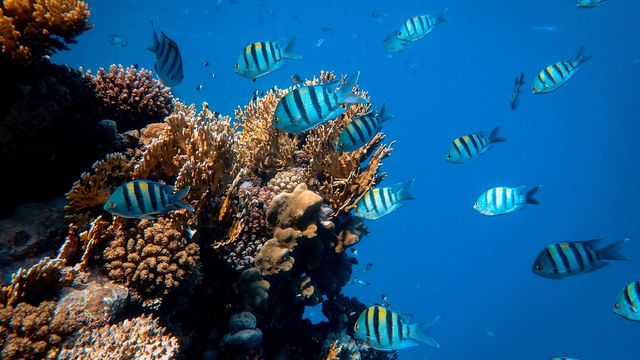Misinformation can lead individuals to make incorrect decisions based on misleading cues. A new study by researchers from Cornell University found that fish can adjust their sensitivity to the actions of others, reducing the risk of overreacting to misinformation. Fish are highly attuned to their surroundings and the actions of other fish. Fish that swim alone or in small groups are extra-sensitive to their surroundings and are more likely to flee when other fish around them startle. However, in large, dense schools, individuals are less likely to flee when a neighboring fish does, as they tune down their sensitivity to social cues and take more risks. The researchers discovered that the fish’s decision-making mechanisms may be preserved in other animals, including humans. The behavior does not differentiate between true threats and misinformation, rather, it adjusts sensitivity to lower the probability of responding to a false alarm. The study’s findings suggest that the need to cope with misinformation may have driven the evolution of how brains process information. The study highlights the importance of considering how misinformation can affect the behavior of animals in the wild.
Fish have been found to possess the ability to adjust their sensitivity to the actions of other fish, reducing the risk of overreacting to misinformation, according to a study. Wild coral reef fish are highly attuned to their surroundings and the actions of others. Fish that swim alone or in small groups are extra-sensitive to their surroundings and are more likely to flee when fish around them startle. However, in large, dense schools, individuals are less likely to flee when a neighboring fish does, as they tune down their sensitivity to social cues and take more risks. This decision-making mechanism may be preserved in other animals, including humans.
The behavior does not differentiate between true threats and misinformation, rather it adjusts sensitivity to lower the probability of responding to a false alarm. According to the study, which was published in the Proceedings of the National Academy of Sciences, individuals in schools of wild foraging fish flee for shelter about once every 8 minutes, even when there is no predator or threat present.
Researchers analyzed underwater recordings of startle events among foraging coral reef fish in Mo’orea, French Polynesia using new computer vision tools, machine learning, and computational modeling. The analysis found that the model adjusts the sensitivity of individuals to signals produced by others, based on their past history of what they have been seeing. The study’s senior author, Andrew Hein, said that when there is a lot of visual motion, individuals seem to lower their sensitivity to it, and when there is very little visual motion, they increase their sensitivity.
The study’s findings suggest that fish have mechanisms for adjusting their behavior in response to misinformation. However, the behavior does not necessarily discriminate between true threats and misinformation, indicating that sensitivity to misinformation may not be unique to humans. The study highlights the importance of considering how misinformation can affect the behavior of animals in the wild.
Misinformation can take many forms, and while deliberate disinformation may be the focus of many discussions, inadvertent and innocent forms of misinformation also exist. Misinformation can cause individuals to make incorrect decisions based on misleading cues. A new study by researchers from Cornell University found that fish can adjust their sensitivity to the actions of others, reducing the risk of overreacting to misinformation.
The researchers used coral reef fish as a model system to study the effects of misinformation. Fish feed in areas where there are predators, causing them to be skittish even when predators are not present. Using computer vision technology, the researchers analyzed footage of the fish from underwater observatories and reconstructed the decisions made by each individual in a frame.
The researchers found that fish are highly attuned to their surroundings and the actions of other fish. Fish that swim alone or in small groups are extra-sensitive to their surroundings and are more likely to flee when other fish around them startle. However, in large, dense schools, individuals are less likely to flee when a neighboring fish does, as they tune down their sensitivity to social cues and take more risks.
The researchers discovered that the fish’s decision-making mechanisms may be preserved in other animals, including humans. The behavior does not differentiate between true threats and misinformation, rather, it adjusts sensitivity to lower the probability of responding to a false alarm.
The study’s findings suggest that the need to cope with misinformation may have driven the evolution of how brains process information. The researchers believe that dynamic control of sensitivity may be widespread in biological systems and may have evolved as a simple but robust way of coping with misinformation.
The study, “Wild Animals Suppress the Spread of Socially-Transmitted Misinformation,” was published in the Proceedings of the National Academy of Sciences. The study’s senior author, Andrew Hein, said that the mechanisms for adjusting sensitivity are crucial if one is going to maintain control over their behavior. The new model was based on well-studied properties of fish neural circuits that control these behaviors.
The study highlights the importance of considering how misinformation can affect the behavior of animals in the wild. Further research is needed to understand the extent to which dynamic control of sensitivity is present in biological systems.
Don’t miss interesting posts on Famousbio

